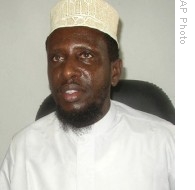VOA标准英语2008年-Somali Islamist Sees Clear Timetable for Ethiop(在线收听)
By Alisha Ryu
Nairobi
19 June 2008
 |
| Sheik Sharif Sheik Ahmed (file photo) |
Sheik Sharif Sheik Ahmed, who led the opposition Alliance for the Reliberation of Somalia delegation, says the peace agreement was signed last week in Djibouti because it included a timetable for the Ethiopian military to leave Somalia.
The opposition leader says the agreement clearly states that Ethiopian troops must leave Somalia and be replaced by troops friendly to Somalia within 120 days. Ahmed says obtaining a specific timetable for withdrawal was the main purpose of entering into talks with the government.
In late 2006, neighboring Ethiopia led a U.S.-supported military campaign to oust Somali Islamists from power and to install the U.N.-backed secular transitional federal government. The move sparked an Islamist-led anti-Ethiopian, anti-government insurgency, which has created what the United Nations calls the worst humanitarian crisis in the world.
Hardliners in Ahmed's opposition group, led by Islamist leader Sheik Hassan Dahir Aweys in Asmara, Eritrea, boycotted the talks in Djibouti. They say the accord aimed at protecting the Ethiopian occupation in Somalia.
Western observers note the timetable for an Ethiopian withdrawal depends on the deployment of a U.N. stabilization force and creation of a force that is sufficient to secure the country. What would constitute a sufficient force is not spelled out in the agreement.
Supporters of Aweys and leaders of an al-Qaida-linked Somali group called the Shabab have vowed to continue fighting against Ethiopia and the Somali government. The number of insurgent attacks in the Somali capital Mogadishu and elsewhere have surged in the past week.
Sheik Sharif Sheik Ahmed says he is in talks with opponents in Asmara to find a way to implement a three-month cease-fire, but he says the international community needs to play its role, too, in the peace process.
Speaking to VOA on the sidelines of a three-day meeting of the Organization of the Islamic Conference in Kampala, Somali Foreign Minister Ali Jama Ahmed says his government is vigorously lobbying nations to support the accord and to offer peacekeeping troops.
"We are lobbying among the OIC and all other members of the United Nations, especially the members of the Security Council, so that the Security Council authorizes the stabilization force as soon as possible because time is not on our side," he said.
Deploying a U.N. force in Somalia within the next four months may pose the biggest challenge to the international community, which is struggling to fulfill commitments made to a U.N.-African Union peacekeeping mission in the Darfur region of western Sudan.
Six months after the mission was launched, only a fraction of the 26,000 peacekeepers promised have been deployed and much-needed equipment and supplies have not yet arrived.